The Painted Veil - Movie Review
 The Painted Veil 2006
The Painted Veil 2006 When W. Somerset Maugham’s “The Painted Veil” was first published in 1925, we thought it was lovely. But it was the jazz age and we were usually drunk off our asses, and barely remember the books we once read. We believe it was set in London and Hong Kong and dealt with a headstrong young lass by the name of Kitty who is trapped in a loveless marriage, fucks the nearest stud to flash his eyes at her, gets caught by her hubby and carted off to the jungle in the middle of a cholera epidemic to ruminate on their failed marriage.
When W. Somerset Maugham’s “The Painted Veil” was first published in 1925, we thought it was lovely. But it was the jazz age and we were usually drunk off our asses, and barely remember the books we once read. We believe it was set in London and Hong Kong and dealt with a headstrong young lass by the name of Kitty who is trapped in a loveless marriage, fucks the nearest stud to flash his eyes at her, gets caught by her hubby and carted off to the jungle in the middle of a cholera epidemic to ruminate on their failed marriage. The third film version, yes kids, the third follows a semi proud tradition. The original version appeared in 1934, directed by the famed Richard Boleslawski and starring Herbert Marshall and George Brent as the spouse and lover of the divine Greta Garbo. It was a success (we loved it, although we might have still been drunk since it was the Depression Era.) and featured a typically divine performance from Garbo. Years later another one of our favorite actresses, Eleanor Parker headlined a less than stellar remake retitled “The Seventh Sin” and co-starred Jean-Pierre Aumont, Bill Travers and that scene stealer George Sanders as the confidant, Waddington.
The third film version, yes kids, the third follows a semi proud tradition. The original version appeared in 1934, directed by the famed Richard Boleslawski and starring Herbert Marshall and George Brent as the spouse and lover of the divine Greta Garbo. It was a success (we loved it, although we might have still been drunk since it was the Depression Era.) and featured a typically divine performance from Garbo. Years later another one of our favorite actresses, Eleanor Parker headlined a less than stellar remake retitled “The Seventh Sin” and co-starred Jean-Pierre Aumont, Bill Travers and that scene stealer George Sanders as the confidant, Waddington. Now, forty nine years later, director John Curran has brought together two wonderfully talented leads, Naomi Watts and Edward Norton to recreate the famed roles in a very handsome and well wrought remake that completely enchanted us for the first hour, and then ran across some road bumps in the second half before it recovered in time to deliver the goods in the final reel. Adding tremendous support are Liev Schreiber and Toby Jones as humpy lover and trusting confidant figures to the bickering Fanes.
Now, forty nine years later, director John Curran has brought together two wonderfully talented leads, Naomi Watts and Edward Norton to recreate the famed roles in a very handsome and well wrought remake that completely enchanted us for the first hour, and then ran across some road bumps in the second half before it recovered in time to deliver the goods in the final reel. Adding tremendous support are Liev Schreiber and Toby Jones as humpy lover and trusting confidant figures to the bickering Fanes. As Kitty Fane, Naomi Watts delivers one of the year’s best performances. We have been fans since her mind numbingly powerful break in David Lynch’s masterpiece “Mulholland Dr.”. Her subsequent Oscar nominated performance in Alejandro González Iñárritu’s “21 Grams” and last years deliciously cinematic remake of “King Kong” justified our faith in her superior skills as an actress.
As Kitty Fane, Naomi Watts delivers one of the year’s best performances. We have been fans since her mind numbingly powerful break in David Lynch’s masterpiece “Mulholland Dr.”. Her subsequent Oscar nominated performance in Alejandro González Iñárritu’s “21 Grams” and last years deliciously cinematic remake of “King Kong” justified our faith in her superior skills as an actress. Two time Oscar nominee Edward Norton continues to impress as Dr. Walter Fane, the quietly humiliated husband who must endure playing the cuckold to his wife’s less than quiet affair in Shanghai. But with such a fine piece of ass as Liev Schreiber as the tempting beau, who could blame her?
Two time Oscar nominee Edward Norton continues to impress as Dr. Walter Fane, the quietly humiliated husband who must endure playing the cuckold to his wife’s less than quiet affair in Shanghai. But with such a fine piece of ass as Liev Schreiber as the tempting beau, who could blame her? Which is the most interesting aspect of the first half of this film. We see the timid courting from Walter Fane to the beautiful but headstrong Kitty who lives out a bored existence off her family’s fortune and good name. While she finds him mildly interesting, she quickly realizes that her family thinks very little of her future prospects and hopes she will not let this one pass her by. One could hardly call this piece a feminist manifesto, but it does do a fine job of portraying a certain type of society woman who had very little choices of her own available to her in the early part of the twentieth century.
Which is the most interesting aspect of the first half of this film. We see the timid courting from Walter Fane to the beautiful but headstrong Kitty who lives out a bored existence off her family’s fortune and good name. While she finds him mildly interesting, she quickly realizes that her family thinks very little of her future prospects and hopes she will not let this one pass her by. One could hardly call this piece a feminist manifesto, but it does do a fine job of portraying a certain type of society woman who had very little choices of her own available to her in the early part of the twentieth century. Kitty agrees to marry Walter, mainly to escape her own prison of ennui. When she is spirited away to China, where Walter is hired to work as a bacteriologist, she enters a different kind of prison. While Walter is never less than civil and gentlemanly to her needs, their marriage is completely without passion. They walk through the required motions and keep a respectable distance from any real feelings. When Kitty is introduced to the charming and sexy Charlie Townsend, she succumbs far quicker than even she herself could suspect.
Kitty agrees to marry Walter, mainly to escape her own prison of ennui. When she is spirited away to China, where Walter is hired to work as a bacteriologist, she enters a different kind of prison. While Walter is never less than civil and gentlemanly to her needs, their marriage is completely without passion. They walk through the required motions and keep a respectable distance from any real feelings. When Kitty is introduced to the charming and sexy Charlie Townsend, she succumbs far quicker than even she herself could suspect. Their brief but fiery affair is quickly discovered by Walter at the worst possible time in his career. For a breakout of the cholera epidemic has occurred in a rural location deeper into China, and he agrees to go and work as their village doctor to examine the ravages of cholera up close. What happens next is the turning point for the film and the relationship between the Fanes. Walter confronts Kitty about her betrayal and gives her an impossible choice: she can accompany him deep into the cholera epidemic or he will file for divorce citing her relationship with Charles as adultery and thereby ruining both their reputations.
Their brief but fiery affair is quickly discovered by Walter at the worst possible time in his career. For a breakout of the cholera epidemic has occurred in a rural location deeper into China, and he agrees to go and work as their village doctor to examine the ravages of cholera up close. What happens next is the turning point for the film and the relationship between the Fanes. Walter confronts Kitty about her betrayal and gives her an impossible choice: she can accompany him deep into the cholera epidemic or he will file for divorce citing her relationship with Charles as adultery and thereby ruining both their reputations. Kitty attempts to call his bluff, and secure a promise from Charlie that he will divorce his own wife and they can rebuild their reputations by marrying each other. We don’t want to give too much away, but suffice to say that Kitty is forced to pack her bags and accompany her now openly hostile husband into the deathtrap awaiting them.
Kitty attempts to call his bluff, and secure a promise from Charlie that he will divorce his own wife and they can rebuild their reputations by marrying each other. We don’t want to give too much away, but suffice to say that Kitty is forced to pack her bags and accompany her now openly hostile husband into the deathtrap awaiting them. Their life in rural China is one that quickly deteriorates into a series of soul baring confrontations exasperated by Kitty’s boredom at having to acquiesce to all of Walter’s needs and his own aggravation at the limited means available to him to care for the victims of cholera who are dropping like flies around him.
Their life in rural China is one that quickly deteriorates into a series of soul baring confrontations exasperated by Kitty’s boredom at having to acquiesce to all of Walter’s needs and his own aggravation at the limited means available to him to care for the victims of cholera who are dropping like flies around him. All of which made for a riveting look at two headstrong individuals that attempt to pick up the pieces of their lives in the middle of a hostile and decidedly foreign environment. We loved it! The first half.
All of which made for a riveting look at two headstrong individuals that attempt to pick up the pieces of their lives in the middle of a hostile and decidedly foreign environment. We loved it! The first half. The second half of the film struggles to find the correct tone and pacing once it begins to devolve into a broader canvas. For the filmmakers have opted to push up the timeframe of the original piece and place it during the height of the Chinese Nationalist uprising. We understand that their intent was to frame the domestic drama of the Fanes within the context of a historical epoch that immediately registered fear, mistrust and hatred of outsiders. We tend to think it was bit of overkill. The Fanes arduous journey into the outback of China, their withering experience amongst the locales perishing of cholera and their decided “otherness” being a proper British couple made it perfectly clear to us that they were indeed strangers in a strange land attempting to find each other.
The second half of the film struggles to find the correct tone and pacing once it begins to devolve into a broader canvas. For the filmmakers have opted to push up the timeframe of the original piece and place it during the height of the Chinese Nationalist uprising. We understand that their intent was to frame the domestic drama of the Fanes within the context of a historical epoch that immediately registered fear, mistrust and hatred of outsiders. We tend to think it was bit of overkill. The Fanes arduous journey into the outback of China, their withering experience amongst the locales perishing of cholera and their decided “otherness” being a proper British couple made it perfectly clear to us that they were indeed strangers in a strange land attempting to find each other. The good news is that the film does recover nicely from that small blunder, through the crafty skills of the director John Curran, the sumptuous and detailed designs by costumer Ruth Myers and production designs by Tu Juhua and the extraordinarily gorgeous score by our favorite modern film composer, Alexandre Desplat. All of which provide the beautiful canvas for the truly wonderful performances by the two leads and their solid supporting cast.
The good news is that the film does recover nicely from that small blunder, through the crafty skills of the director John Curran, the sumptuous and detailed designs by costumer Ruth Myers and production designs by Tu Juhua and the extraordinarily gorgeous score by our favorite modern film composer, Alexandre Desplat. All of which provide the beautiful canvas for the truly wonderful performances by the two leads and their solid supporting cast. Naomi Watts and Edward Norton find and deliver every nuance of the unhappy Fanes. From cautious courtship, to the polite exchanges of their blossoming marriage to the pain and emotional evisceration brought on by Kitty’s infidelity through the heartfelt ending.
Naomi Watts and Edward Norton find and deliver every nuance of the unhappy Fanes. From cautious courtship, to the polite exchanges of their blossoming marriage to the pain and emotional evisceration brought on by Kitty’s infidelity through the heartfelt ending. Toby Jones as the outwardly trusting and inwardly decadent Waddington delivers another finely etched performance after his terrific lead turn as Truman Capote in the delightful bauble “Infamous”. Here, he reeks of the fallen gentleman who maintains his secure hold on the local peasantry by the sheer force of his charm and intelligence. A sort of bastard love child to Sydney Greenstreet and Peter Lorre, if those two famed scene stealers could have procreated.
Toby Jones as the outwardly trusting and inwardly decadent Waddington delivers another finely etched performance after his terrific lead turn as Truman Capote in the delightful bauble “Infamous”. Here, he reeks of the fallen gentleman who maintains his secure hold on the local peasantry by the sheer force of his charm and intelligence. A sort of bastard love child to Sydney Greenstreet and Peter Lorre, if those two famed scene stealers could have procreated. And finally although certainly not lastly, Dame Diana Rigg appears as the Mother Superior to the Belgian convent that is responsible for the care and Christianization of the Chinese orphans of the plague. As usual, her star power, charisma and legendary acting talent work wonders on the least interesting role. Still, the old Dame is not without her guile as she manages to maintain a steady hold on her position in this crumbling society. Witness her exquisitely delivered speech to Kitty as she attempts to help her find her path as she reveals some surprising secrets about her own life. Perfect as usual, Dame Diana. (The picture above is not too recent, in case you were wondering. Assholes.)
And finally although certainly not lastly, Dame Diana Rigg appears as the Mother Superior to the Belgian convent that is responsible for the care and Christianization of the Chinese orphans of the plague. As usual, her star power, charisma and legendary acting talent work wonders on the least interesting role. Still, the old Dame is not without her guile as she manages to maintain a steady hold on her position in this crumbling society. Witness her exquisitely delivered speech to Kitty as she attempts to help her find her path as she reveals some surprising secrets about her own life. Perfect as usual, Dame Diana. (The picture above is not too recent, in case you were wondering. Assholes.) So, while the second half of the movie may attempt too much and lose its storytelling drive we still found many aspects to “The Painted Veil” to be very entertaining. The solid first half, the handsome design and the fine acting throughout. It definitely helped to leave us feeling cinematically satisfied that the film ends on a boffo emotional note and for once, a coda that doesn’t seem forced or unnecessary. Film lovers of epic drama should run out and see it, for it is one of the few period films in recent years to excel at the human drama. We just wish they had kept the focus tightly on the fascinating Fanes. Bless you all!
So, while the second half of the movie may attempt too much and lose its storytelling drive we still found many aspects to “The Painted Veil” to be very entertaining. The solid first half, the handsome design and the fine acting throughout. It definitely helped to leave us feeling cinematically satisfied that the film ends on a boffo emotional note and for once, a coda that doesn’t seem forced or unnecessary. Film lovers of epic drama should run out and see it, for it is one of the few period films in recent years to excel at the human drama. We just wish they had kept the focus tightly on the fascinating Fanes. Bless you all!Directed by John Curran
Screenplay by Ron Nyswaner
Based on the novel by W. Somerset Maugham
Starring
Naomi Watts as Kitty Fane
Edward Norton as Walter Fane
Liev Schreiber as Charlie Townsend
Toby Jones as Waddington
Diana Rigg as Mother Superior
Lorraine Laurence as Sister Maryse
Gesang Meiduo as Amah
Juliet Howland as Dorothy Townsend
Anthony Wong Chau-Sang as Colonel Yu
Original Music by Alexandre Desplat
Cinematography by Stuart Dryburgh
Film Editing by Alexandre de Franceschi
Costume Design by Ruth Myers
Production Design by Tu Juhua
Art Direction by Peta Lawson
Labels: Movie Review

 Closing out this year of the
Closing out this year of the 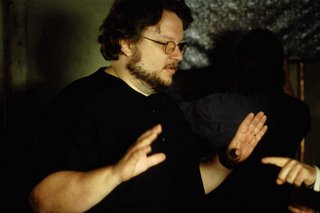 Guillermo del Toro has been on our short list of favorite directors for a few years now, and hardly anybody outside of
Guillermo del Toro has been on our short list of favorite directors for a few years now, and hardly anybody outside of 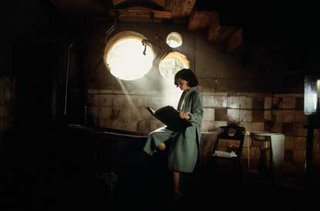 Thankfully, Señor del Toro is a real honest to dios talent that has the skill and storytelling abilities to avoid the clichés of chainsaw wielding zombies and is able to focus equally on character, story, mood and atmosphere. Despite an unfortunate early foray into Hollywood Horrorland with the 1997 giant-cockroach-stalking-the-subways flick, “
Thankfully, Señor del Toro is a real honest to dios talent that has the skill and storytelling abilities to avoid the clichés of chainsaw wielding zombies and is able to focus equally on character, story, mood and atmosphere. Despite an unfortunate early foray into Hollywood Horrorland with the 1997 giant-cockroach-stalking-the-subways flick, “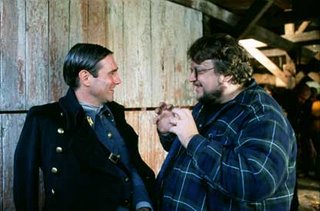 There are some wonderful scenes in “
There are some wonderful scenes in “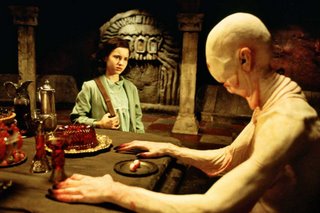 Two forays into the Comic Fanboy genre, “
Two forays into the Comic Fanboy genre, “ “El Laberinto del Fauno” is wonderful for many reasons. First and foremost is the visual beauty of the film. Del Toro has always brought the perfect textual feel to his films, carefully constructing sets and using evocative locations to capture a sense of wonder and otherworldliness. In this, he is greatly aided by his excellent production team, costume designers Lala Huete and Rocio Redondo and the extraordinarily gifted cinematographer Guillermo Navarro. This film feels and looks like no other flick this year, and it is a sight to behold.
“El Laberinto del Fauno” is wonderful for many reasons. First and foremost is the visual beauty of the film. Del Toro has always brought the perfect textual feel to his films, carefully constructing sets and using evocative locations to capture a sense of wonder and otherworldliness. In this, he is greatly aided by his excellent production team, costume designers Lala Huete and Rocio Redondo and the extraordinarily gifted cinematographer Guillermo Navarro. This film feels and looks like no other flick this year, and it is a sight to behold.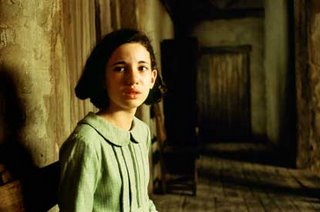 Secondly, del Toro does not ignore characterization in the pursuit of entertainment or thrills. This finely crafted tale of a young girl obsessed with fairy tales relies heavily on the skill and honesty of the young Ivana Baquero who beautifully captures that indefinable ability to believe in the magical that only children truly possess. For this film to work, we must trust the character of Ofelia and her belief in fairies, fauns and demons. Thankfully, with Ivana Baquero, del Toro has found the perfect young actress. Bravo to both of them!
Secondly, del Toro does not ignore characterization in the pursuit of entertainment or thrills. This finely crafted tale of a young girl obsessed with fairy tales relies heavily on the skill and honesty of the young Ivana Baquero who beautifully captures that indefinable ability to believe in the magical that only children truly possess. For this film to work, we must trust the character of Ofelia and her belief in fairies, fauns and demons. Thankfully, with Ivana Baquero, del Toro has found the perfect young actress. Bravo to both of them!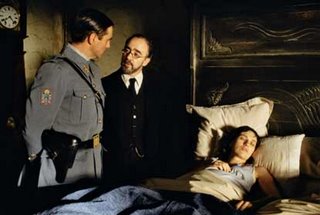 As the young Ofelia, Ivana’s character is brought to the Spanish countryside during the Civil War by her very pregnant mother Carmen to live under the care of her new husband, one Capitán Vidal whose ability to inflict harm on every conceivable level is unknown to either of them. His base camp is run with a taut leather glove clad fist, sequestered amidst the forested hills filled with Spanish rebels bravely attempting to maintain their ground.
As the young Ofelia, Ivana’s character is brought to the Spanish countryside during the Civil War by her very pregnant mother Carmen to live under the care of her new husband, one Capitán Vidal whose ability to inflict harm on every conceivable level is unknown to either of them. His base camp is run with a taut leather glove clad fist, sequestered amidst the forested hills filled with Spanish rebels bravely attempting to maintain their ground. The camp is overseen by the level headed gaze of Mercedes, outwardly the dutiful servant who hides a few surprises herself. Under her watchful stare, young Ofelia attempts to avoid the wrath of her stepfather by escaping into her various books filled with fantasy. A fantasy that becomes reality when she stumbles upon Pan’s Labyrinth.
The camp is overseen by the level headed gaze of Mercedes, outwardly the dutiful servant who hides a few surprises herself. Under her watchful stare, young Ofelia attempts to avoid the wrath of her stepfather by escaping into her various books filled with fantasy. A fantasy that becomes reality when she stumbles upon Pan’s Labyrinth. 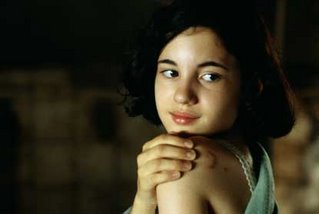 Pan informs Ofelia that she is not of this world – that she is in reality a princess waiting for her calling home to a kingdom filled with her greatest desires fulfilled. But of course, there is a catch. She must perform three assigned tasks in order to reclaim her crown. We don’t wish to spoil the details of the tasks, since they form the backbone of this richly macabre and fantastically realistic drama.
Pan informs Ofelia that she is not of this world – that she is in reality a princess waiting for her calling home to a kingdom filled with her greatest desires fulfilled. But of course, there is a catch. She must perform three assigned tasks in order to reclaim her crown. We don’t wish to spoil the details of the tasks, since they form the backbone of this richly macabre and fantastically realistic drama.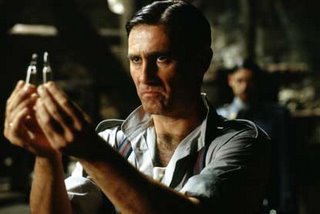 Guillermo del Toro is to be commended for managing to balance the real life drama of the
Guillermo del Toro is to be commended for managing to balance the real life drama of the  The cast is more than up to the challenge, delivering terrific performances throughout. Ivana Baquero is never cloying or preternaturally unbelievable as so many child actors seem to be portrayed. She is alive with wonder and awe at her mysterious journey, while managing to be honest to the character’s intrinsically quiet nature. We believe this child looks for an escape from her war-torn surroundings, to escape into the world of fairies as her only solace. When she must learn to overcome her greatest fears, they challenges faced and the emotional surrendering are wonderfully played.
The cast is more than up to the challenge, delivering terrific performances throughout. Ivana Baquero is never cloying or preternaturally unbelievable as so many child actors seem to be portrayed. She is alive with wonder and awe at her mysterious journey, while managing to be honest to the character’s intrinsically quiet nature. We believe this child looks for an escape from her war-torn surroundings, to escape into the world of fairies as her only solace. When she must learn to overcome her greatest fears, they challenges faced and the emotional surrendering are wonderfully played.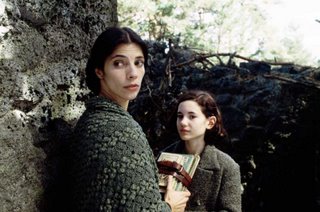 Maribel Verdú as Mercedes, the servant with a few secrets of her own delivers the other stand out performance. We were shocked to realize halfway through the film that this was the same actress who was so engaging as the older woman sandwiched between two very horny young pranksters in Alfonso Cuarón’s delightful “
Maribel Verdú as Mercedes, the servant with a few secrets of her own delivers the other stand out performance. We were shocked to realize halfway through the film that this was the same actress who was so engaging as the older woman sandwiched between two very horny young pranksters in Alfonso Cuarón’s delightful “ All of which encapsulates the charms and wonder of this breathtaking movie. Guillermo del Toro is officially the great fabulist of our time. Possessing the steady visual control of a
All of which encapsulates the charms and wonder of this breathtaking movie. Guillermo del Toro is officially the great fabulist of our time. Possessing the steady visual control of a 
 This is the story of seven strangers. No, not that
This is the story of seven strangers. No, not that  The film is told through a series of vignettes that briefly take a jaundiced look at the lives of these women who are all somehow affected by the grisly discovery of a mutilated corpse in a barren landscape. Writer / Director Karen Moncrieff should be commended for her fine casting, a who’s who of talented actresses and actors that work very hard in trying to pull off the near impossible. Fine characterizations under the tiresome burden of a veneer thin scenario with limited time allotted to each individuals story. The acting is fine throughout, the final film, not so much. It lies there, well like a mutilated corpse in a field.
The film is told through a series of vignettes that briefly take a jaundiced look at the lives of these women who are all somehow affected by the grisly discovery of a mutilated corpse in a barren landscape. Writer / Director Karen Moncrieff should be commended for her fine casting, a who’s who of talented actresses and actors that work very hard in trying to pull off the near impossible. Fine characterizations under the tiresome burden of a veneer thin scenario with limited time allotted to each individuals story. The acting is fine throughout, the final film, not so much. It lies there, well like a mutilated corpse in a field. Oscar nominees
Oscar nominees 
 Toni Collette is a marvel as the victimized daughter whose newfound celebrity as the discoverer of the dead girl begins to shine a new light into her defeated existence. She makes us care for a woman who is beyond caring. And by that, we mean her complete inability to apply makeup.
Toni Collette is a marvel as the victimized daughter whose newfound celebrity as the discoverer of the dead girl begins to shine a new light into her defeated existence. She makes us care for a woman who is beyond caring. And by that, we mean her complete inability to apply makeup. Unfortunately, the screenplay attempts too many red herrings and false endings from the very get go. She soon meets a menacing grocery store clerk who seems too infatuated and far too knowledgeable about the details of grisly crimes for his own good. As played by the deliciously talented
Unfortunately, the screenplay attempts too many red herrings and false endings from the very get go. She soon meets a menacing grocery store clerk who seems too infatuated and far too knowledgeable about the details of grisly crimes for his own good. As played by the deliciously talented 
 As her mother,
As her mother,  As the humpy young co-worker, our future husband
As the humpy young co-worker, our future husband  Worse for the moviegoer, the next vignette features
Worse for the moviegoer, the next vignette features  Oscar winner
Oscar winner  But when you resort to putting a prim and proper matron with a crack whore – the subtlety is thrown out the window. This is the least interesting scene for the forced set up alone. And of course we know where this is going. The sinner forgives the sinned, or the reverse . . . depends on your mood, or if you're still awake.
But when you resort to putting a prim and proper matron with a crack whore – the subtlety is thrown out the window. This is the least interesting scene for the forced set up alone. And of course we know where this is going. The sinner forgives the sinned, or the reverse . . . depends on your mood, or if you're still awake. To the dead girl herself. As the film draws to its protracted conclusion, we follow
To the dead girl herself. As the film draws to its protracted conclusion, we follow  Would that the script she finally chose not to embarrass herself in were a bit better. “The Dead Girl” is filled with such talented actors, many of which deliver some very effective work that it seems a true waste to not have developed better roles for them. We sincerely appreciated the attempt, and found the direction from Miss Moncrieff to be a notch above her other cohorts in the indie circuit. At least she could appreciate the look of the film. We loved the opening scene with its washed out landscape and gritty evocation of squalor, but if the directors intention was to reveal emotional truths to the various characters by their tenuous connection to the gruesome crime it didn’t really work for us. Still, we appreciated getting the chance to see some fine actresses strut their stuff. Bless you all!
Would that the script she finally chose not to embarrass herself in were a bit better. “The Dead Girl” is filled with such talented actors, many of which deliver some very effective work that it seems a true waste to not have developed better roles for them. We sincerely appreciated the attempt, and found the direction from Miss Moncrieff to be a notch above her other cohorts in the indie circuit. At least she could appreciate the look of the film. We loved the opening scene with its washed out landscape and gritty evocation of squalor, but if the directors intention was to reveal emotional truths to the various characters by their tenuous connection to the gruesome crime it didn’t really work for us. Still, we appreciated getting the chance to see some fine actresses strut their stuff. Bless you all!
 If we ever needed a vivid example of the power of great acting and crisp direction to overcome a tired scenario, this is it. “Notes on a Scandal” breaks absolutely no new ground cinematically. It is squarely and quite tritely in the category of revenge thriller made infamous by such films as “
If we ever needed a vivid example of the power of great acting and crisp direction to overcome a tired scenario, this is it. “Notes on a Scandal” breaks absolutely no new ground cinematically. It is squarely and quite tritely in the category of revenge thriller made infamous by such films as “ The reason that his film is showing up on Best of the Year lists, and frequently mentioned alongside the fabled name of Oscar is the casting of
The reason that his film is showing up on Best of the Year lists, and frequently mentioned alongside the fabled name of Oscar is the casting of  Dame Judi Dench is already the proud possessor of an Oscar for her two seconds of screen time in “
Dame Judi Dench is already the proud possessor of an Oscar for her two seconds of screen time in “ Stripped of any semblance of attractiveness, and yes, even though she is no supermodel, the Dame can pull it together enough to pass for a handsome woman of un certain age – case in point, her turn as “M” in the delightful “
Stripped of any semblance of attractiveness, and yes, even though she is no supermodel, the Dame can pull it together enough to pass for a handsome woman of un certain age – case in point, her turn as “M” in the delightful “ As a history teacher to a rapidly declining civilization that cares more for reality shows and handheld electronics, she looks upon her young charges with utter contempt and her peers with a reserved mask of politeness that barely disguises her disgust. Into her life saunters one Sheba Hart, the new Art teacher that seems to represent everything Barbara loathes and envies.
As a history teacher to a rapidly declining civilization that cares more for reality shows and handheld electronics, she looks upon her young charges with utter contempt and her peers with a reserved mask of politeness that barely disguises her disgust. Into her life saunters one Sheba Hart, the new Art teacher that seems to represent everything Barbara loathes and envies.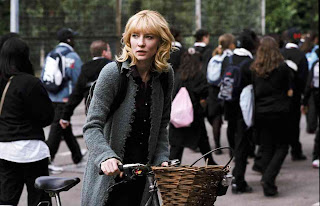 Sheba is of course portrayed by the absurdly talented Cate Blanchett who is three for three this year in wonderful performances following her supporting turn in “
Sheba is of course portrayed by the absurdly talented Cate Blanchett who is three for three this year in wonderful performances following her supporting turn in “ Watching these two fine actresses weave their way through the not so subtle maze of a storyline is one of the great pleasures of the year. Dame Judi has rarely been cast as an out-and-out villain, and she is too fine an actress to choose such a cartoon like character without finding an infinite variety of methods to flesh out this vile woman into a fully rounded human being. While we certainly cannot condone Barbara’s actions, we understand completely her own rationale and twisted logic.
Watching these two fine actresses weave their way through the not so subtle maze of a storyline is one of the great pleasures of the year. Dame Judi has rarely been cast as an out-and-out villain, and she is too fine an actress to choose such a cartoon like character without finding an infinite variety of methods to flesh out this vile woman into a fully rounded human being. While we certainly cannot condone Barbara’s actions, we understand completely her own rationale and twisted logic. Our beloved Cate Blanchett is saddled with the more difficult role to eschew. Her Sheba is a woman out to undermine her own happiness. Married to a man several years her senior, she is the mother of two children who has opted to return to the workforce in order to satisfy her yearnings. For what, she isn’t exactly clear. Until her dreamy gaze falls upon a strikingly attractive and legally unapproachable young man in one of her classes by the name of Steven Connolly.
Our beloved Cate Blanchett is saddled with the more difficult role to eschew. Her Sheba is a woman out to undermine her own happiness. Married to a man several years her senior, she is the mother of two children who has opted to return to the workforce in order to satisfy her yearnings. For what, she isn’t exactly clear. Until her dreamy gaze falls upon a strikingly attractive and legally unapproachable young man in one of her classes by the name of Steven Connolly. Before you can whisper Mrs. Robinson, she is blowing the bloke and reveling in her forbidden sin. Unfortunately for the both of them, they have been found out by Barbara. Before you can scream “Psychotic-Closeted-Lesbian!”, Barbara has manipulated Sheba into a parasitic relationship wherein Babs promises to keep mum to demonstrate her undying devotion to her new best friend.
Before you can whisper Mrs. Robinson, she is blowing the bloke and reveling in her forbidden sin. Unfortunately for the both of them, they have been found out by Barbara. Before you can scream “Psychotic-Closeted-Lesbian!”, Barbara has manipulated Sheba into a parasitic relationship wherein Babs promises to keep mum to demonstrate her undying devotion to her new best friend. Where the plot takes us next is not too difficult to figure out. For despite her best intentions and seemingly heartfelt promises to Barbara, Sheba just can’t seem to keep her grubby hands off the little piece of ass teenager! (Slut.) Okay, we could hardly blame her, for Andrew Simpson is one cute little puppy as Steven Connolly! Ahem. We mean, he is one fine young actor . . . oh hell, he’s dreamy and perfectly cast in that regard. It remains to be seen if he is a fine actor, but his screen presence is undeniable.
Where the plot takes us next is not too difficult to figure out. For despite her best intentions and seemingly heartfelt promises to Barbara, Sheba just can’t seem to keep her grubby hands off the little piece of ass teenager! (Slut.) Okay, we could hardly blame her, for Andrew Simpson is one cute little puppy as Steven Connolly! Ahem. We mean, he is one fine young actor . . . oh hell, he’s dreamy and perfectly cast in that regard. It remains to be seen if he is a fine actor, but his screen presence is undeniable. And here we must thank director Richard Eyre for his smart choices. When Sheba explains all the ins and outs, NOT THOSE, you perverts – rather when she attempts to explain to Barbara how exactly the affair began we are treated to a very smartly edited montage that while not exonerating Sheba’s choices, makes us understand her reasoning. In order for us to care about the drama, Eyre and screenwriter
And here we must thank director Richard Eyre for his smart choices. When Sheba explains all the ins and outs, NOT THOSE, you perverts – rather when she attempts to explain to Barbara how exactly the affair began we are treated to a very smartly edited montage that while not exonerating Sheba’s choices, makes us understand her reasoning. In order for us to care about the drama, Eyre and screenwriter  “Knock, knock.”
“Knock, knock.” We suppose Richard figured that the theatricality of the genre needed an equally dramatic score, but he would be wrong. Thankfully, Glass’ own particular brand of elevator music does not outshine the sterling performances by Dench and Blanchett.
We suppose Richard figured that the theatricality of the genre needed an equally dramatic score, but he would be wrong. Thankfully, Glass’ own particular brand of elevator music does not outshine the sterling performances by Dench and Blanchett. The only other actor in the piece who manages to crane his neck in between the electrically charged divas is Bill Nighy, that naughty scene stealer from the drippy “
The only other actor in the piece who manages to crane his neck in between the electrically charged divas is Bill Nighy, that naughty scene stealer from the drippy “ Still, once you have seen this well helmed and brilliantly acted thriller, you will hardly be able to remember anything other than Dame Judi and the future Dame Cate! Their emotional thrust and parry, the way they manage to play every nuance and reach every note so perfectly more than compensates for any less than perfect choices – we’re still looking at you, Philip Glass. So, run don’t walk to the nearest cinema and take a gander at “Notes on a Scandal”. You’ll be glad we sent you. Bless you all!
Still, once you have seen this well helmed and brilliantly acted thriller, you will hardly be able to remember anything other than Dame Judi and the future Dame Cate! Their emotional thrust and parry, the way they manage to play every nuance and reach every note so perfectly more than compensates for any less than perfect choices – we’re still looking at you, Philip Glass. So, run don’t walk to the nearest cinema and take a gander at “Notes on a Scandal”. You’ll be glad we sent you. Bless you all! (Endnote: Do yourselves an even bigger favor, and run out of the theatre prior to the bizarrely amateurish coda at the end of the movie. It is a horrid misstep from the otherwise reliable Richard Eyre. We get it, Dick. This wasn’t her first time. But you made that perfectly clear in the context of the movie, why treat us like imbeciles? Okay, okay. We’re harping. Go see it, already! They are fabulous, and deserving of their surefire Oscar nominations! Go! Before we stalk you.)
(Endnote: Do yourselves an even bigger favor, and run out of the theatre prior to the bizarrely amateurish coda at the end of the movie. It is a horrid misstep from the otherwise reliable Richard Eyre. We get it, Dick. This wasn’t her first time. But you made that perfectly clear in the context of the movie, why treat us like imbeciles? Okay, okay. We’re harping. Go see it, already! They are fabulous, and deserving of their surefire Oscar nominations! Go! Before we stalk you.)
